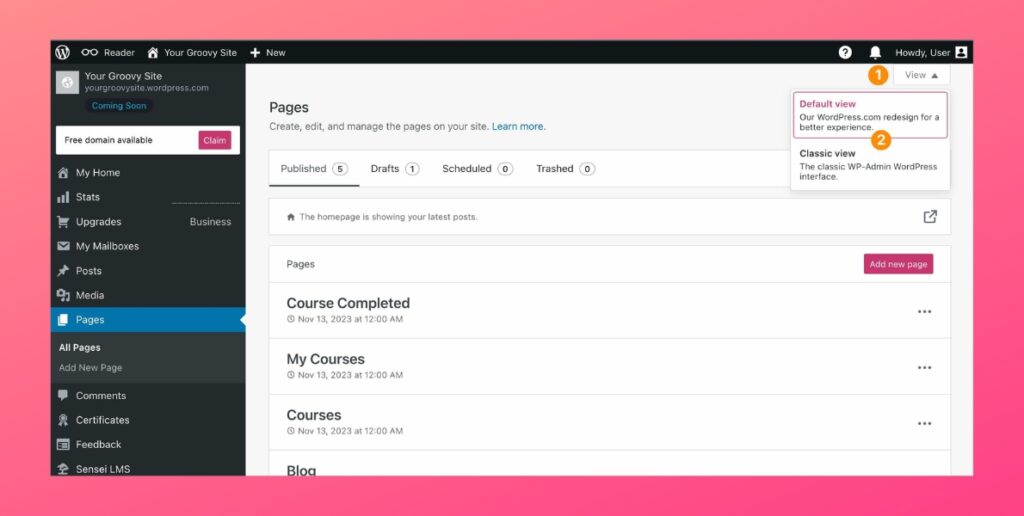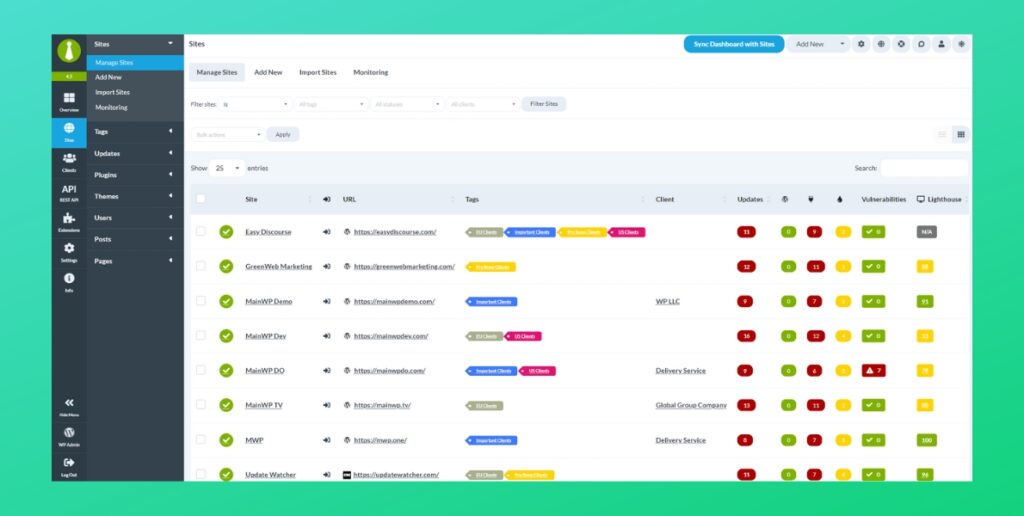Finding web designers in Chicago can be an endless search and significantly impact your small business’s success. Hiring a professional web designer helps you create a strong online presence that attracts customers and drives growth. With a unique and functional website, you can stand out among competitors and effectively communicate your brand’s message.
DiviCode is among the top web designers located in Chicago that offer web development services, website design and development, UX design solutions, SEO plans, creative design, web solutions, and more.
We believe in affordable web design in Chicago, and you can start today with one of our design specialists now!
Choosing one of the best web design companies that understands small business needs is essential in a city bustling with options. A good web designer not only builds an appealing site but also considers important factors like SEO and mobile optimization. These elements ensure that your website is not just beautiful but also performs well, giving you an advantage in the digital marketplace with an award-winning web design package.
The process of working with a Chicago based web designer should feel collaborative. You will want to ensure they understand your goals, vision, and target audience. This partnership can make a significant difference in how your business is perceived online.
Key Takeaways From Web Development Projects
- Professional web design enhances your business’s online presence.
- Prioritize SEO and mobile optimization for better performance.
- Collaborate closely with your designer for best results.
Benefits of Professional Web Design for Small Businesses

Investing in professional web design offers many advantages for your small business. Here are some key benefits:
- First Impressions Count: A well-designed website creates a strong first impression. Visitors often decide whether to engage with your brand based on your website’s appearance.
- User Experience: Professional designers focus on creating a seamless user experience. This means your website will be easy to navigate, helping potential customers find what they need quickly.
- Mobile Compatibility: A responsive design ensures your website looks great on all devices, from desktops to smartphones. This is crucial as more users access websites from mobile devices.
- Search Engine Optimization (SEO): Good web design includes SEO best practices. This helps improve your visibility in search engine results, making it easier for customers to find you.
- Brand Identity: A custom-designed website reflects your brand’s identity. It helps differentiate you from competitors and establishes credibility with your audience.
- Support and Maintenance: Many web design services offer ongoing support. This ensures your website stays updated and functional, allowing you to focus on running your business.
Professional web design is not just about aesthetics. It’s a strategic investment that can enhance your online presence and drive growth for your small business.
Key Considerations When Choosing a Web Designer Based in Chicago

Selecting the right web designer for your small business in Chicago involves several important factors. You need to focus on understanding your brand, budgeting effectively, assessing portfolios, and considering the designer’s experience with the local market.
Understanding Your Brand and Audience
Before choosing a designer, it’s essential to know your brand’s identity. What message do you want to convey? Think about your unique selling points and how they reflect in the design.
Your target audience should influence design choices. Consider age, preferences, and behaviors of your customers. A good designer can help translate your brand into visuals that resonate.
Discussing your brand with potential designers ensures they grasp your vision. A strong understanding leads to a design that aligns with your goals and appeals to your audience.
Budgeting for Web Design Services
Setting a budget is crucial when hiring a web designer. Consider all costs, including design, hosting, and maintenance. Small businesses often have limited resources, so it’s important to allocate funds wisely.
Get quotes from various designers to understand the market rate. Compare what is included in each proposal. Sometimes, a lower price might mean fewer services. Choose options that offer the best value for your investment.
Keep in mind that good web design is an investment in your business. It’s worth prioritizing quality over the lowest price for better long-term results.
Evaluating the Designer’s Portfolio
A designer’s portfolio provides insights into their style and capabilities. Look for examples relevant to your industry and compare them with your vision.
Pay attention to the functionality of past projects. Beautiful designs are important, but they must also be user-friendly. The site should navigate well and load quickly.
Check for diversity in the portfolio. A designer who can handle various styles shows versatility. Reach out to previous clients if possible to gain feedback about their experience.
Considering Designer’s Experience with the Chicago Market
It’s beneficial to select a designer familiar with the Chicago web design and digital market. Local designers understand regional trends and audience preferences. They can tailor the design to suit local tastes and culture, making it more relatable to your customers.
Ask potential designers about their experience with local businesses. They may have insights that can enhance your project. A designer who knows the local landscape can also help with SEO strategies to improve online visibility.
Choosing a designer who understands your market can lead to a more effective website that resonates with your audience.
The Design Process

The design process for small business websites is essential to creating a successful online presence. You will go through several key steps that ensure your website meets your needs and goals.
Initial Consultation and Strategy
During the initial consultation, you will communicate your business goals and vision for the website. This meeting is crucial for establishing a clear understanding of your brand, target audience, and desired functionalities.
The designer will ask questions to gather insights about your competition and explore what works in your industry. This collaborative approach helps develop a tailored strategy to guide the project effectively. You should come prepared with materials like examples of websites you like, any branding guidelines, and ideas for content.
Wireframing and Mockups
After the initial consultation, the designer will create wireframes or mockups. Wireframes are basic layouts that outline the structure of your website. They help visualize where elements like text, images, and buttons will go with design and web development.
Once you approve the wireframes, the designer will move on to creating mockups. These mockups incorporate colors, fonts, and more detailed design elements. You will have the chance to give feedback on these visual representations, which is important for ensuring the final design aligns with your vision.
Design Implementation
Once your mockups are approved, the designer will begin the actual development of the website. This stage includes coding the site and implementing various design elements.
You should expect the integration of functional features like navigation menus, forms, and e-commerce capabilities if needed. It’s vital that the website is also optimized for mobile devices, as many users will access it from smartphones. The designer will pay close attention to performance and speed during this phase.
Review and Revisions
After implementation, you will conduct a thorough review of the website. This stage allows you to test all functionalities, like links and forms, to ensure everything works correctly.
You can also suggest revisions at this point. Whether you want to fine-tune the design or adjust specific features, clear communication is key. It’s important that you feel confident about the website before it goes live, so don’t hesitate to share your thoughts.
Launch and Post-Launch Support in Chicago Web Design
The launch of your website is an exciting milestone. The designer will help ensure everything is functioning correctly and ready for the public.
After the site goes live, you should also receive support for a period following the launch. This support can include troubleshooting any issues that arise and making necessary updates. Many designers offer maintenance plans to help keep your site running smoothly and securely. This ongoing support helps you focus on growing your business while ensuring a positive online experience for your customers.
SEO and Mobile Optimization
To succeed online, your website must be optimized for search engines and mobile users. Understanding these elements can directly impact your visibility and user experience.
The Importance of SEO in Web Design
Search Engine Optimization (SEO) is essential for attracting visitors to your website. A well-designed site incorporates SEO best practices, making it easier for search engines to index your content.
Key components include:
- Keyword Research: Use relevant keywords that reflect what users search for in your industry.
- Meta Tags: Optimize title tags and meta descriptions to improve click-through rates.
- Content Quality: Provide valuable, unique content that keeps users engaged.
By implementing these practices, you increase your site’s chances of ranking higher in search results, driving more traffic to your business.
Responsive Design for Mobile Users
With more people using smartphones, responsive design is crucial. This approach ensures your website looks and functions well on all devices, including phones and tablets.
Key features of responsive design include:
- Fluid Grids: Use percentages for layout elements to make them adapt to screen sizes.
- Flexible Images: Ensure images scale correctly without losing clarity.
- Touch-Friendly Navigation: Design buttons and links that are easy to tap.
By optimizing your site for mobile users, you enhance user experience, reduce bounce rates, and improve your SEO ranking. Mobile-friendly sites are more likely to retain visitors and encourage conversions.
Content Management Systems

A good Content Management System (CMS) can make running a small business website easier. It helps you manage content without needing deep technical skills. Choosing the right CMS is crucial for your online success.
Choosing the Right CMS
When selecting a CMS, consider your business needs first. If you want ease of use, look for platforms like WordPress or Shopify. They offer intuitive interfaces that let you make updates quickly.
Think about your design flexibility, as well. Some systems allow extensive customization while others have limited options.
Also, check for support and community. A strong user community means you can easily find help when needed. Look for features such as SEO tools, mobile compatibility, and security updates. These elements can significantly improve your website’s performance and security.
Custom vs. Pre-Built Templates
Deciding between custom and pre-built templates is essential for your site’s appearance and functionality.
Custom templates offer unique designs tailored to your brand. They will usually look more professional and match your style perfectly. However, they tend to be more expensive and require ongoing maintenance.
Pre-built templates are budget-friendly and come with ready-made designs. You can quickly set up your site and launch it. While they may lack uniqueness, many templates offer good customization options.
Consider your design goals, budget, and time before choosing. A well-thought-out decision can enhance your brand image and improve user experience on your site.
Analytics and Reporting Tools

Analytics and reporting tools are essential for understanding how well your website performs. They help you track visitor behavior, monitor traffic sources, and assess the effectiveness of your marketing efforts. Any Chicago web design and development team should be offering these services.
Integrating Analytics into Your Website
To make data-driven decisions, you need to integrate analytics into your website. Popular tools like Google Analytics and Adobe Analytics can provide valuable insights.
- Setup: Begin by creating an account with your chosen analytics tool. You’ll receive a tracking code to add to your website’s code.
- Data Collection: Once set up, these tools track user interactions, page views, and session durations, among other metrics.
- Real-Time Monitoring: You can view real-time data, allowing you to see immediate effects of campaigns or changes.
Make sure to regularly check your analytics dashboard to monitor trends and adjust your strategies as needed.
Understanding Website Performance Metrics
Performance metrics are key indicators of your website’s success. Knowing what to look for helps you optimize your site effectively.
- Traffic Sources: Identify where your visitors come from—organic search, social media, or direct visits.
- Bounce Rate: This shows the percentage of visitors who leave after viewing only one page. A high bounce rate may need investigation.
- Conversion Rate: This is the percentage of visitors who complete a desired action, like making a purchase or signing up for a newsletter.
Regularly reviewing these metrics will help you understand user behavior and improve your website’s effectiveness over time.
Maintaining Your Web Projects

Keeping your website in top shape is essential for its performance and security. Regular maintenance helps ensure that your site runs smoothly and provides a good user experience. Two key areas to focus on are updates for security and content management.
Regular Updates and Security
To protect your website, regular updates are crucial. This includes updating your content management system (CMS), plugins, and themes. Frequent updates help fix bugs and vulnerabilities that could lead to security issues.
You should also implement security measures such as SSL certificates and firewalls. SSL certificates encrypt data, providing a safer browsing experience. Regularly back up your website data to avoid losing valuable information in case of a security breach.
Additionally, monitor your website for any unusual activity. Use security plugins that offer alerts and scans. Keeping everything up to date will strengthen your site’s defenses and maintain its credibility.
Content Updates and Management
Content is the heart of your website. Regularly updating your content keeps it fresh and relevant. This includes blog posts, product descriptions, and company information.
You can create a content calendar to plan updates effectively. Aim to post new content regularly, as it not only engages visitors but also helps with search engine optimization (SEO).
Don’t forget to review existing content. Update outdated information and improve to align with current trends. Engage with your audience through comments or social media links. This interaction can provide valuable feedback for future content and improve your site’s visibility.
E-Commerce Integration

E-commerce integration is essential for small businesses looking to expand their online presence. This involves setting up features like shopping cart functionality and payment gateways to create a seamless shopping experience for customers.
Implementing Shopping Cart Functionality
To set up shopping cart functionality, choose a reputable e-commerce platform. Popular options include Shopify, WooCommerce, and Magento. These platforms provide built-in shopping cart features that simplify the online purchasing process.
Key features to implement include:
- User-Friendly Interface: Ensure customers find the cart easily.
- Save Cart Feature: Allow users to save their selections for later purchase.
- Inventory Management: Keep track of stock levels automatically.
These tools help enhance customer satisfaction and increase conversion rates.
Payment Gateway Setup
Once the shopping cart is in place, setting up a payment gateway is crucial. A payment gateway securely processes credit card and other payment transactions.
Select a provider that integrates smoothly with your e-commerce platform. Popular options are PayPal, Stripe, and Square.
When setting up your payment gateway, focus on:
- Security Features: Ensure PCI compliance to protect customer data.
- Multiple Payment Options: Provide choices like credit cards, e-wallets, and bank transfers.
- Clear Checkout Process: Minimize the number of steps to boost purchase completion rates.
These elements help create a safe and efficient payment process for your customers.
Social Media Integration

Social media integration is crucial for small business design and development projects. It helps you connect with your audience and boost your online presence. Here are the key benefits of integrating social media into your site:
- Increased Engagement: Social media buttons allow visitors to share your content easily. This can lead to more interactions and a larger audience.
- Real-Time Updates: You can stream your social media feeds directly on your website. This keeps your content fresh and your audience informed about your latest news.
- Enhanced Credibility: Displaying your social media profiles showcases your brand. It helps build trust with potential customers by showing that you are active and engaged.
- Improved SEO: Links to your social profiles can drive traffic to your website. This can positively impact your search engine rankings.
To integrate social media effectively, consider these tips:
- Choose Relevant Platforms: Focus on platforms that align with your business and target audience.
- Use Clear Call-to-Action Buttons: Ensure buttons for sharing and following are easy to find and understand.
- Monitor Analytics: Keep track of how social media traffic affects your website. This will help you refine your strategy.
By prioritizing social media integration, you can enhance user experience and foster growth for your small business.
Legal Compliance and Accessibility Standards

In the digital landscape, ensuring legal compliance and meeting accessibility standards is critical for small business web designers in Chicago. This involves understanding and implementing the Americans with Disabilities Act (ADA) standards and protecting user data through solid privacy policies.
Adhering to ADA Standards
The ADA requires websites to be accessible to all users, including those with disabilities. This means incorporating features like text alternatives for images, keyboard navigation, and adaptable content for screen readers.
Key elements to consider include:
- Alt text for images.
- Proper heading structures for navigation.
- Color contrast for readability.
Using tools like WAVE or Axe can help identify accessibility issues on your site. Regularly performing audits will keep your site compliant with evolving standards. Many organizations also provide resources for guidance, including recent updates on ADA regulations.
Privacy Policies and User Data Security
Protecting user data is vital for building trust and meeting legal requirements. You need a clear privacy policy that describes how customer data is collected, used, and protected.
Consider these essential components for your privacy policy:
- Data Collection: Explain what data you gather and why.
- User Rights: Inform users of their rights regarding their data, including how to access or delete it.
- Security Measures: Detail the steps you take to protect user data, such as encryption and secure servers.
Keeping your privacy policy updated is crucial, especially with changes in laws and regulations. Make this information easily accessible on your website to enhance user confidence and ensure compliance with legal standards.
Conclusion: Finding The Right Chicago Web Design Agency

When it comes to finding a digital marketing agency that caters to the needs of small businesses and nonprofit organizations, Chicago is home to some of the best options. Whether you’re looking for a full-service agency in Chicago that specializes in website design, or you’re interested in a team that offers both web design and marketing, you’ll find a variety of services to meet your needs. Many of these agencies also excel in print design, business card creation, and experience design, giving businesses comprehensive solutions that extend beyond digital spaces.
For companies looking to hire the best web professionals, it’s essential to seek out an agency specializing in both design and some form of digital marketing such as SEO or social media marketing. A website design agency with a strong focus on creating tailored solutions will offer more than just a basic website; they’ll provide a comprehensive web experience that aligns with your brand. Whether you’re located in or near Chicago, you’ll want to work with an agency whose services include web design as well as web development and design to ensure a cohesive, functional, and visually appealing online presence.
Chicago is known for being home to some of the leading web design firms. Many of these agencies are not only recognized locally but have been featured as a 2024 top web design company. Their teams often consist of experts who have worked on recent web projects and have a deep understanding of tailored web solutions. From business card design to complex website builds, these agencies provide services designed to boost the digital presence of both small businesses and nonprofit organizations. Choosing a web design and digital marketing agency that is dedicated to offering personalized strategies will ensure your online presence remains strong and competitive in today’s fast-paced digital world.
Common Questions and Answers For Chicago Web Design

Q: What should I look for when choosing a web design company in Chicago?
A: When selecting a web design company in Chicago, consider their portfolio, expertise in web development, client reviews, and the range of digital marketing services they offer. It’s also important to assess their understanding of your specific needs and their ability to provide ongoing support.
Q: How can a Chicago web design company enhance my online presence?
A: A Chicago web design company can enhance your online presence through professional website design, optimized user experience (UX), and effective digital marketing strategies. They can help you attract more visitors and convert them into customers through tailored marketing services.
Q: What is the typical web design process followed by web design agencies?
A: The typical web design process includes initial consultation, research and planning, design and development, testing, and launch. A good marketing agency will also consider ongoing maintenance and digital marketing services post-launch to ensure continued success.
Q: How do I know if a web design and development company is affordable?
A: To determine if a web design and development company is affordable, compare their pricing with other design companies, look for transparent pricing models, and check if they offer packages that fit your budget without compromising on quality.
Q: What digital marketing services should a top Chicago web design agency provide?
A: A top Chicago web design agency should provide a range of digital marketing services, including SEO, social media marketing, content marketing, email marketing, and pay-per-click advertising. These services work together to drive traffic and increase engagement on your website.
Q: Can I find web design companies in Chicago that specialize in WordPress website development?
A: Yes, several web design companies in Chicago specialize in WordPress website development. They can create customized WordPress sites that are user-friendly and optimized for performance. Lucky for you, you landed here at DiviCode! Check out our WordPress Web Design services now, built in Chicago.
Q: What are the benefits of hiring a marketing agency for my website design project?
A: Hiring a marketing agency for your website design project brings the advantage of integrated marketing strategies that align with the design. This ensures your website is not only visually appealing but also optimized for search engines and effective in converting visitors.
Q: How do design companies in Chicago approach graphic design in web development?
A: Design companies in Chicago typically integrate graphic design into web development by creating visually appealing layouts, selecting appropriate color schemes, and ensuring brand consistency across all digital platforms. This helps in enhancing the overall user experience.
Q: What should I expect from a web design project timeline?
A: The timeline for a web design project can vary, but generally, you can expect the process to take anywhere from a few weeks to a few months. This will depend on the complexity of the project, the required features, and the web development company’s workload.
Q: Are there any top web design trends I should consider for my project in 2024?
A: In 2024, some top web design trends to consider include minimalistic designs, bold typography, interactive elements, and mobile-first design. Staying updated on these trends can help your website stand out and provide a better user experience.




0 Comments